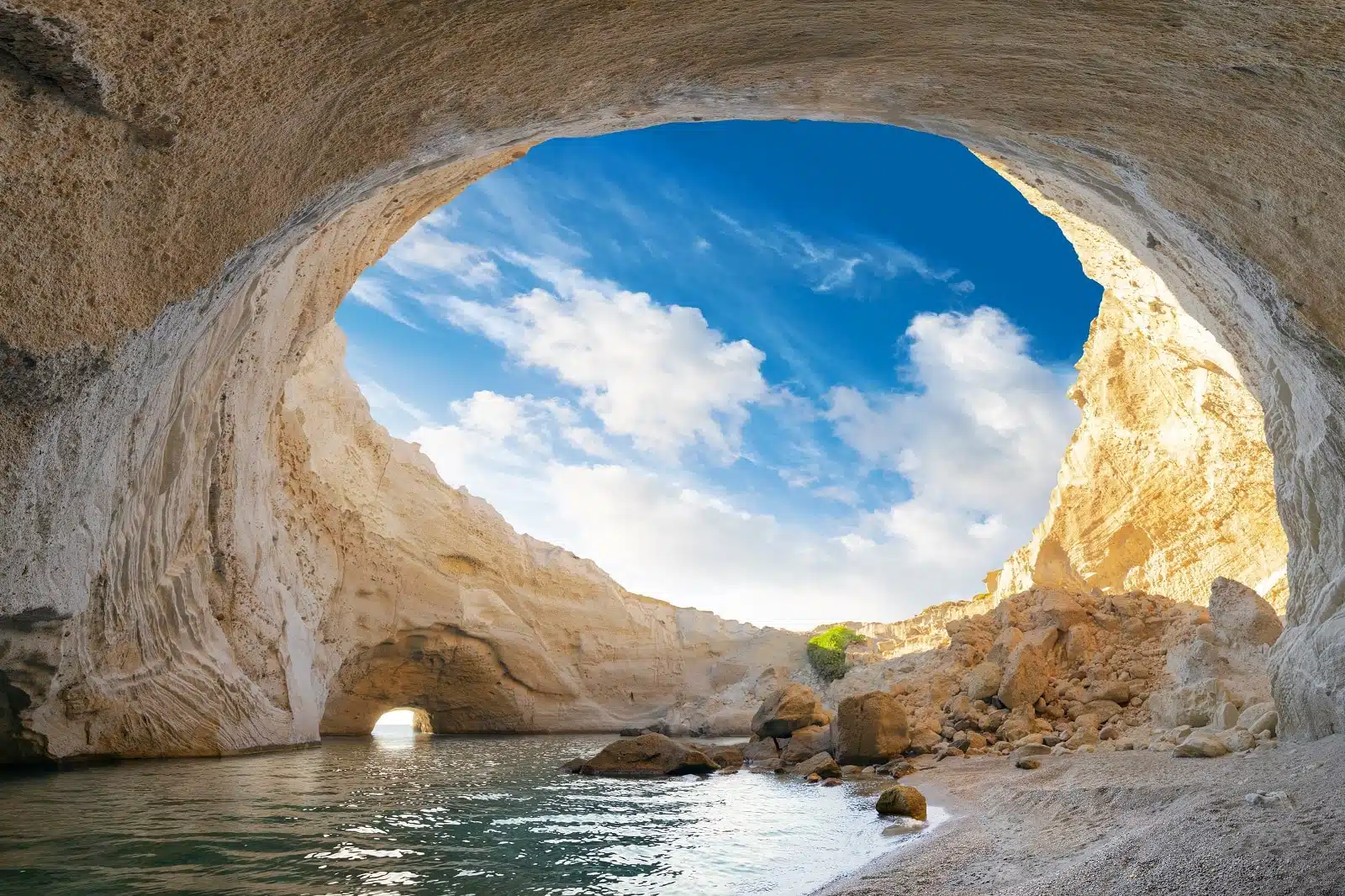Caving, or spelunking, is an exhilarating adventure that takes you deep into the heart of the earth. This guide explores 12 of the world’s most fascinating caves, each offering a unique subterranean experience. From vast underground networks to caves adorned with ancient art, these destinations provide a glimpse into the planet’s hidden depths.
1. Mammoth Cave, Kentucky, USA
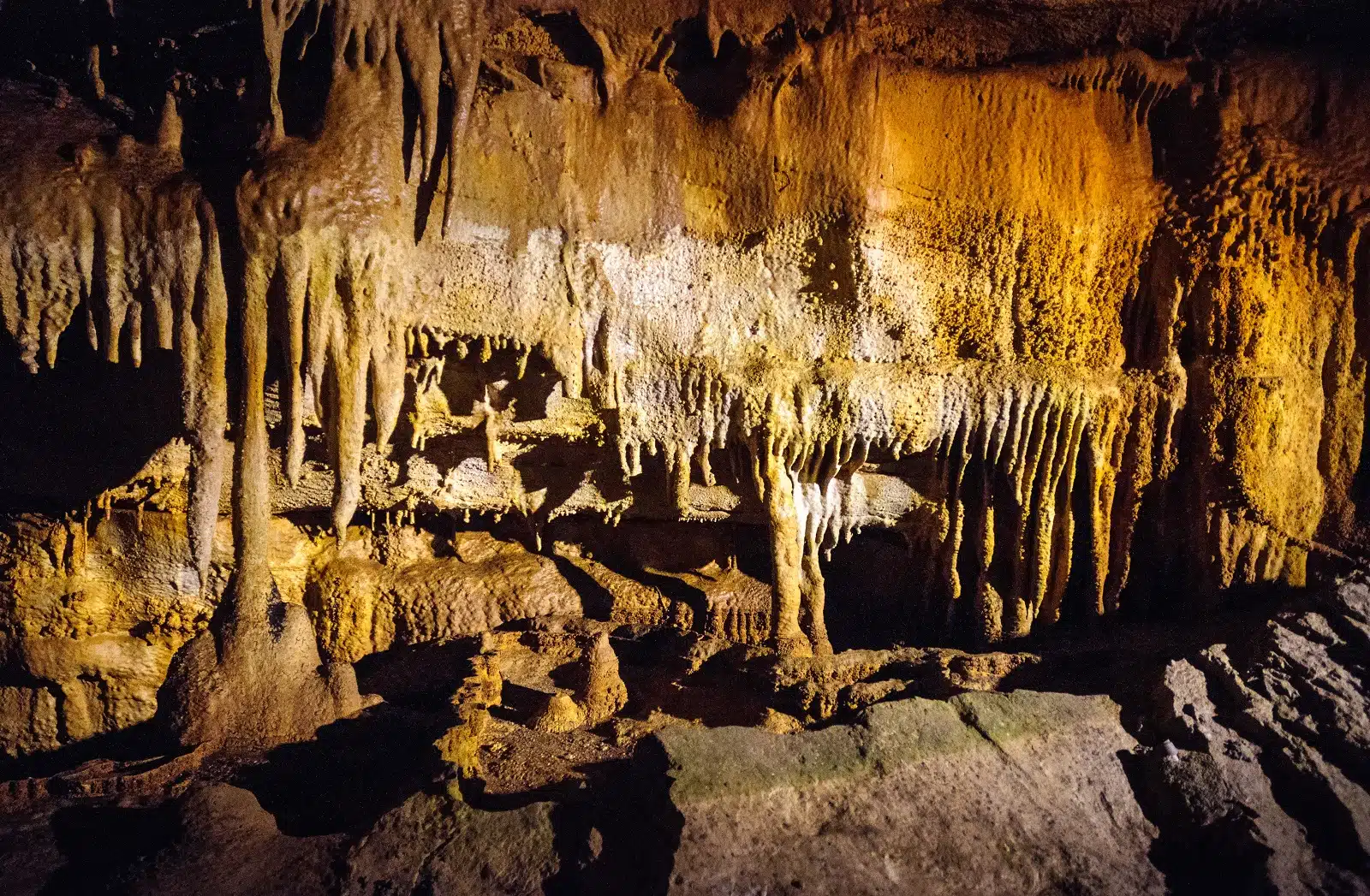
Image Credit: Shutterstock / Zack Frank
Mammoth Cave National Park, a UNESCO World Heritage Site, is an underground marvel boasting over 400 miles of surveyed passageways. As the world’s longest cave system, it presents diverse geological features, including vast chambers, intricate limestone labyrinths, and unique formations. The cave’s rich history encompasses ancient Native American mummies and artifacts, remnants of 19th-century saltpeter mining, and tales of tuberculosis patients seeking cures in its depths. Above ground, the park’s surface is a haven for hiking, horseback riding, and exploring the Green River. The Frozen Niagara tour and the challenging Wild Cave Tour offer varied experiences, from leisurely walks to rigorous crawling passages. Mammoth Cave holds a sense of mystery and grandeur, making it a must-visit for casual explorers and serious spelunkers.
Insider’s Tip
Take the Historic Tour for a comprehensive introduction to the cave’s history.
When to Travel
Spring or fall for moderate temperatures and fewer crowds.
How to Get There
Fly to Louisville, Kentucky, and drive to Mammoth Cave National Park.
2. Waitomo Glowworm Caves, New Zealand
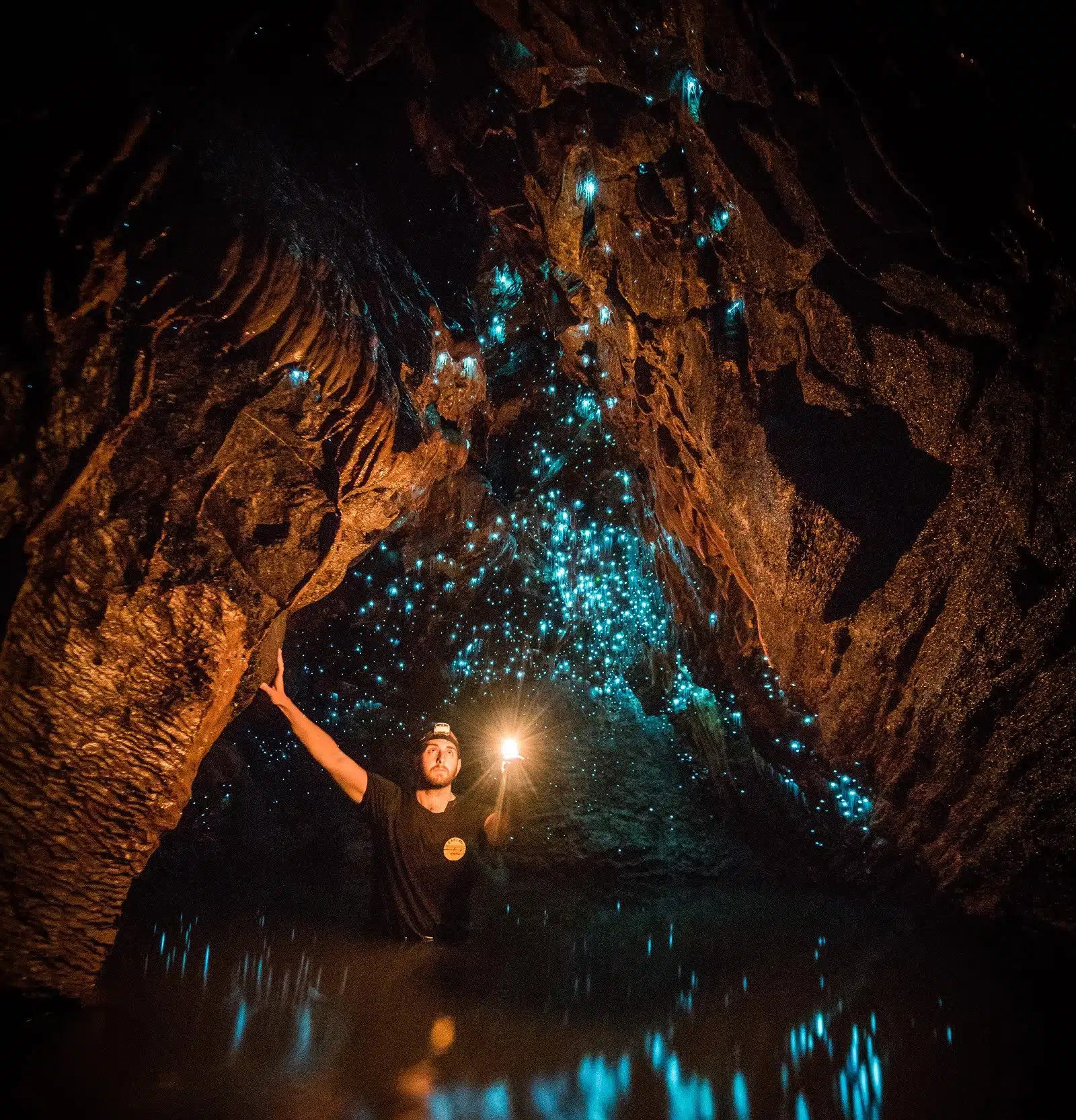
Image Credit: Shutterstock / Shaun Jeffers
The Waitomo Glowworm Caves in New Zealand offer an ethereal experience unique to the region. The caves are home to thousands of glowworms (Arachnocampa luminosa), creating a starry effect on the cave ceilings. This natural light display is best experienced through a silent boat ride along the underground Waitomo River, where the glowworms illuminate the dark caverns. The cave system also features impressive limestone formations, including stalactites and stalagmites, sculpted over thousands of years. The Ruakuri Cave, part of the Waitomo system, provides an opportunity to explore on foot, with its spiral entrance and echoing waterfalls. This cave experience is visually stunning and a journey into a unique ecosystem.
Insider’s Tip
Opt for a boat tour to fully appreciate the glowworms’ luminescent display.
When to Travel
Visit year-round, but avoid peak tourist seasons for a more intimate experience.
How to Get There
Fly to Auckland and drive to Waitomo.
3. Skocjan Caves, Slovenia

Image Credit: Shutterstock / Kurka Geza Corey
The Skocjan Caves in Slovenia, a UNESCO World Heritage site, highlight nature’s sculpting prowess. This extensive underground canyon, carved by the Reka River, features one of the largest known underground chambers in the world. The caves are renowned for their enormous size, breathtaking stalactites and stalagmites, and diverse subterranean landscapes. A walk through the Skocjan Caves is a journey through a series of awe-inspiring caverns, echoing with the sounds of the river far below. The highlight is crossing the Cerkevnik Bridge, suspended high above the canyon floor, offering dramatic views of the cave system. The caves also play a crucial role in biodiversity and regional ecology, adding scientific significance to their natural beauty.
Insider’s Tip
Don’t miss the panoramic views from the Cerkevnik Bridge.
When to Travel
April to October for guided tours of the entire cave system.
How to Get There
Fly to Ljubljana and drive to the Skocjan Caves.
4. Cueva de los Verdes, Lanzarote, Spain
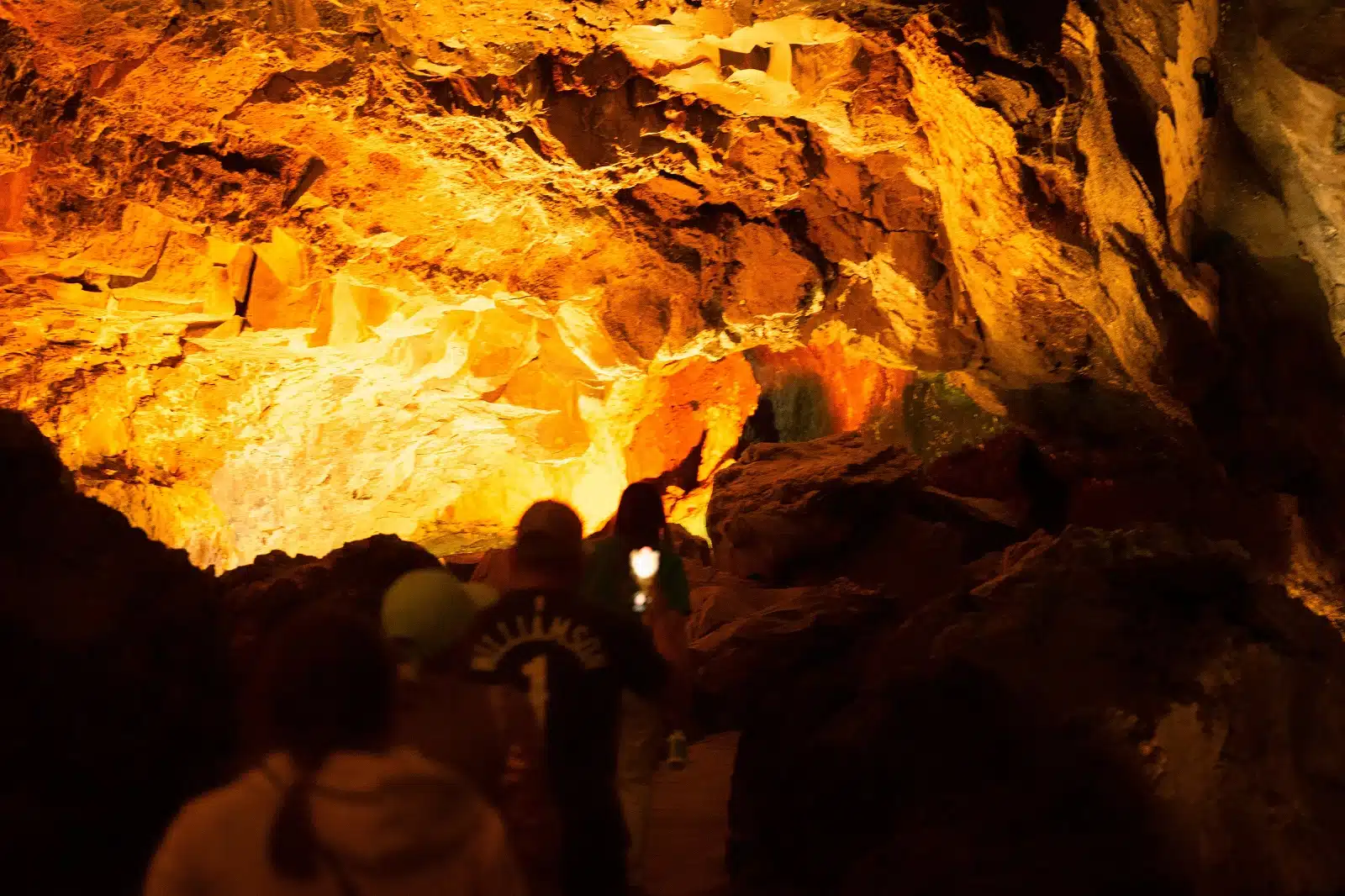
Image Credit: Shutterstock / IvanGar_Fotografia
Cueva de los Verdes, part of an extensive underground tunnel system formed by the Monte Corona volcano, offers a unique exploration experience. This lava tube, one of the longest in the world, reveals the powerful forces of nature and the beauty that can arise from volcanic activity. The cave tour leads through a series of illuminated passageways and chambers showcasing a variety of volcanic formations. A highlight is the concert hall, located within the cave, known for its excellent acoustics and atmospheric concerts. The cave’s history is equally fascinating, having served as a hideout from pirate invasions. The Cueva de los Verdes blends natural wonder, historical intrigue, and cultural significance.
Insider’s Tip
Look out for the optical illusion at the end of the tour.
When to Travel
Year-round, but spring and fall offer pleasant weather and fewer tourists.
How to Get There
Fly to Lanzarote Airport and drive to Cueva de los Verdes.
5. Eisriesenwelt Ice Cave, Austria
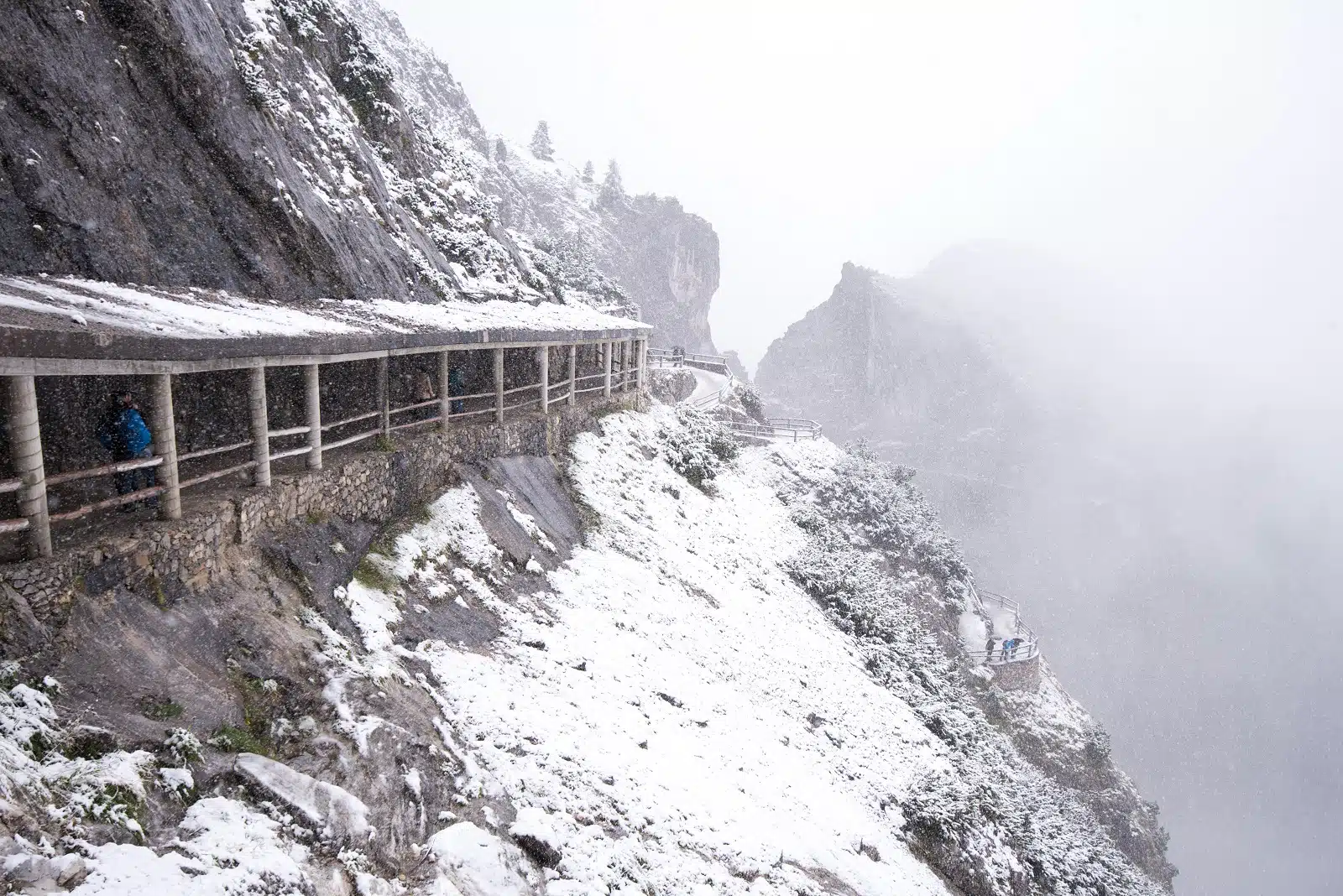
Image Credit: Shutterstock / Marek Fontan
Eisriesenwelt, located in Werfen, Austria, is the largest ice cave in the world, offering a mesmerizing journey through its icy interior. This natural wonder, stretching over 42 kilometers, is filled with breathtaking ice formations, including towering ice walls, frozen waterfalls, and delicate ice stalactites. The cave’s formations change seasonally as melting snow from the mountains above seeps into the cave and refreeze. A visit to Eisriesenwelt involves a combination of hiking and cable car rides leading to the cave entrance. Inside, guided tours illuminate the ice sculptures with magnesium lamps, creating a magical play of light and shadow. This cave is not just a natural spectacle but also a fascinating study of glaciology and the power of nature.
Insider’s Tip
Dress warmly, as temperatures inside the cave remain chilly year-round.
When to Travel
May to October, as the cave is closed in winter.
How to Get There
Fly to Salzburg and drive to Werfen.
6. Son Doong Cave, Vietnam
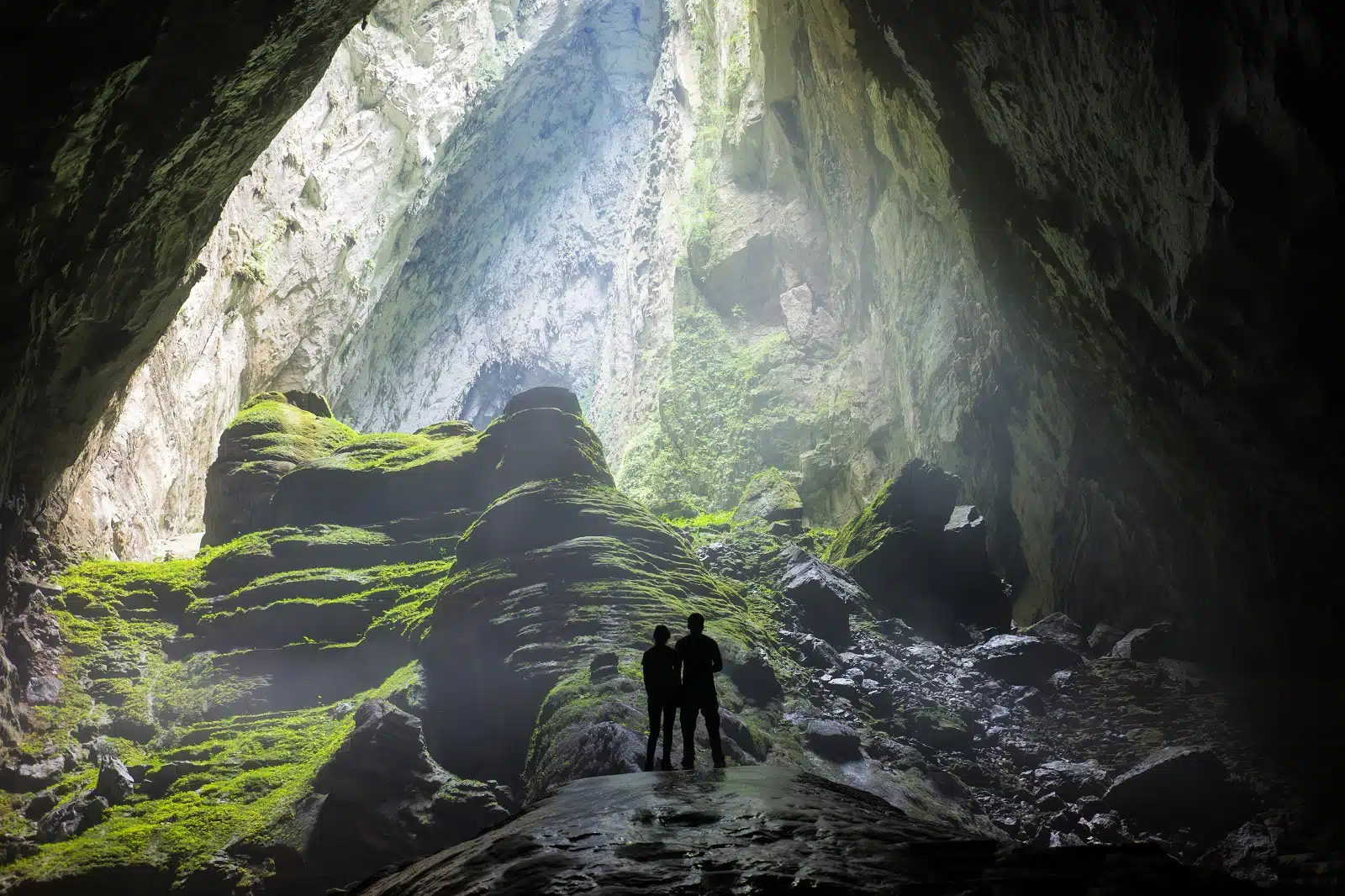
Image Credit: Shutterstock / Vietnam Stock Images
Son Doong Cave in Vietnam, the largest cave in the world, offers an unparalleled adventure. Discovered in 2009, this colossal cave boasts its own ecosystem, complete with a localized weather system, underground river, and unique biodiversity. The cave’s massive scale includes giant stalagmites, up to 70 meters tall, and caverns large enough to house an entire city block. Exploring Son Doong is an expedition that includes trekking through dense jungle, navigating subterranean rivers, and camping inside the cave. Highlights include the Garden of Edam, a collapsed doline with a jungle inside the cave, and the Great Wall of Vietnam, a 90-meter tall calcite barrier. This cave is a true natural wonder, offering a once-in-a-lifetime experience for the most intrepid adventurers.
Insider’s Tip
Book your expedition well in advance, as tours are limited and fill up quickly.
When to Travel
February to August for the best conditions.
How to Get There
Fly to Dong Hoi, then travel to Phong Nha-Ke Bang National Park.
7. Ajanta Caves, Maharashtra, India
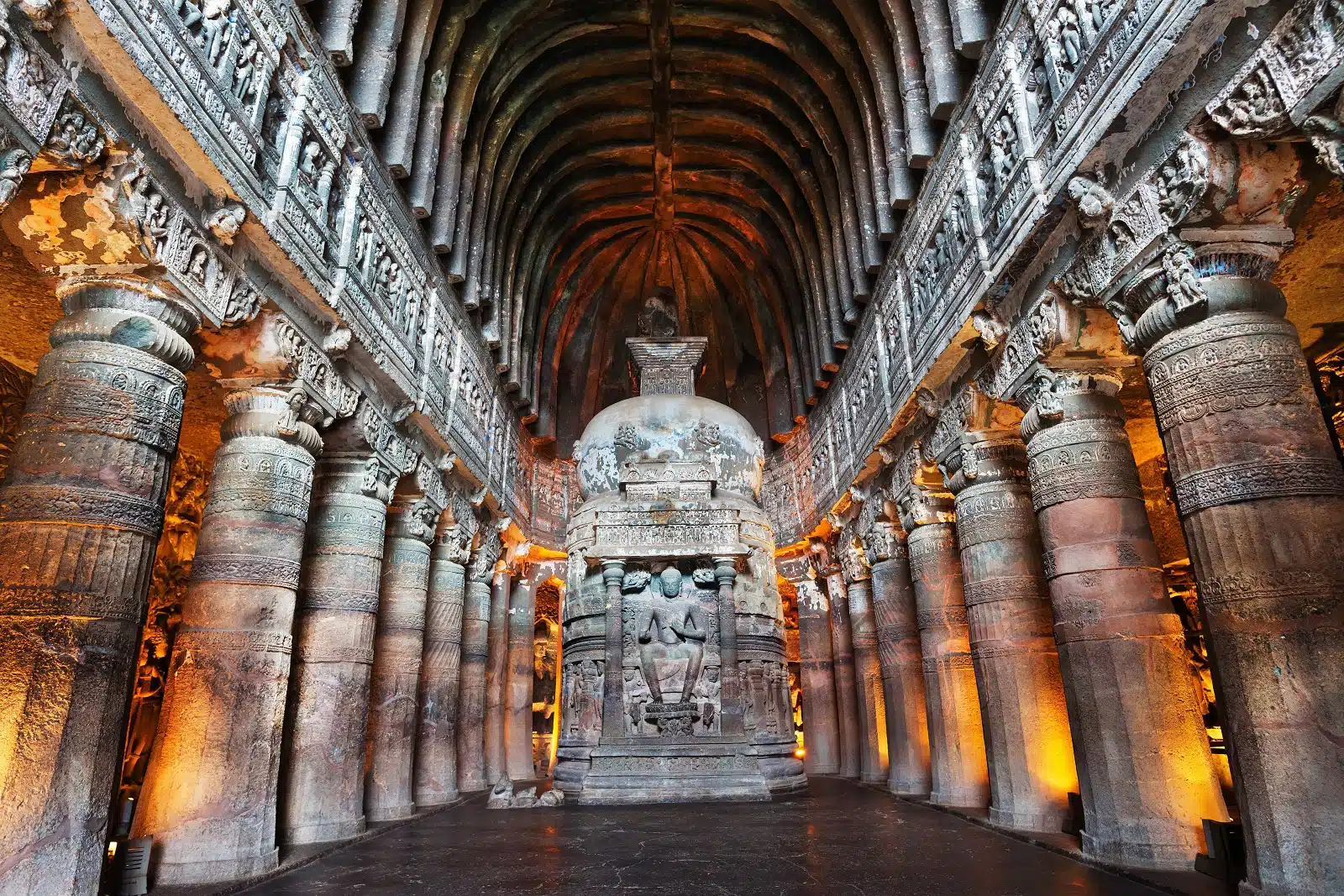
Image Credit: Shutterstock / Sandra Foyt
The Ajanta Caves in Maharashtra, India, are a magnificent series of 29 Buddhist rock-cut cave temples. Dating back to the 2nd century BCE, these caves are celebrated for their exquisite murals and sculptures, considered masterpieces of Buddhist religious art. The caves were carved into a horseshoe-shaped cliff along the Waghora River, providing a serene and spiritual setting. Each cave is a sanctum of art and history, with intricate paintings depicting the life of Buddha and various Jataka tales. The use of natural light in these caves plays a significant role in the visibility and preservation of the paintings. The Ajanta Caves offer a profound insight into ancient Indian art, architecture, and the history of Buddhism.
Insider’s Tip
Hire a guide to gain insights into the historical and cultural significance of the cave paintings.
When to Travel
November to March for cooler temperatures.
How to Get There
Fly to Aurangabad and drive to the Ajanta Caves.
8. Carlsbad Caverns, New Mexico, USA
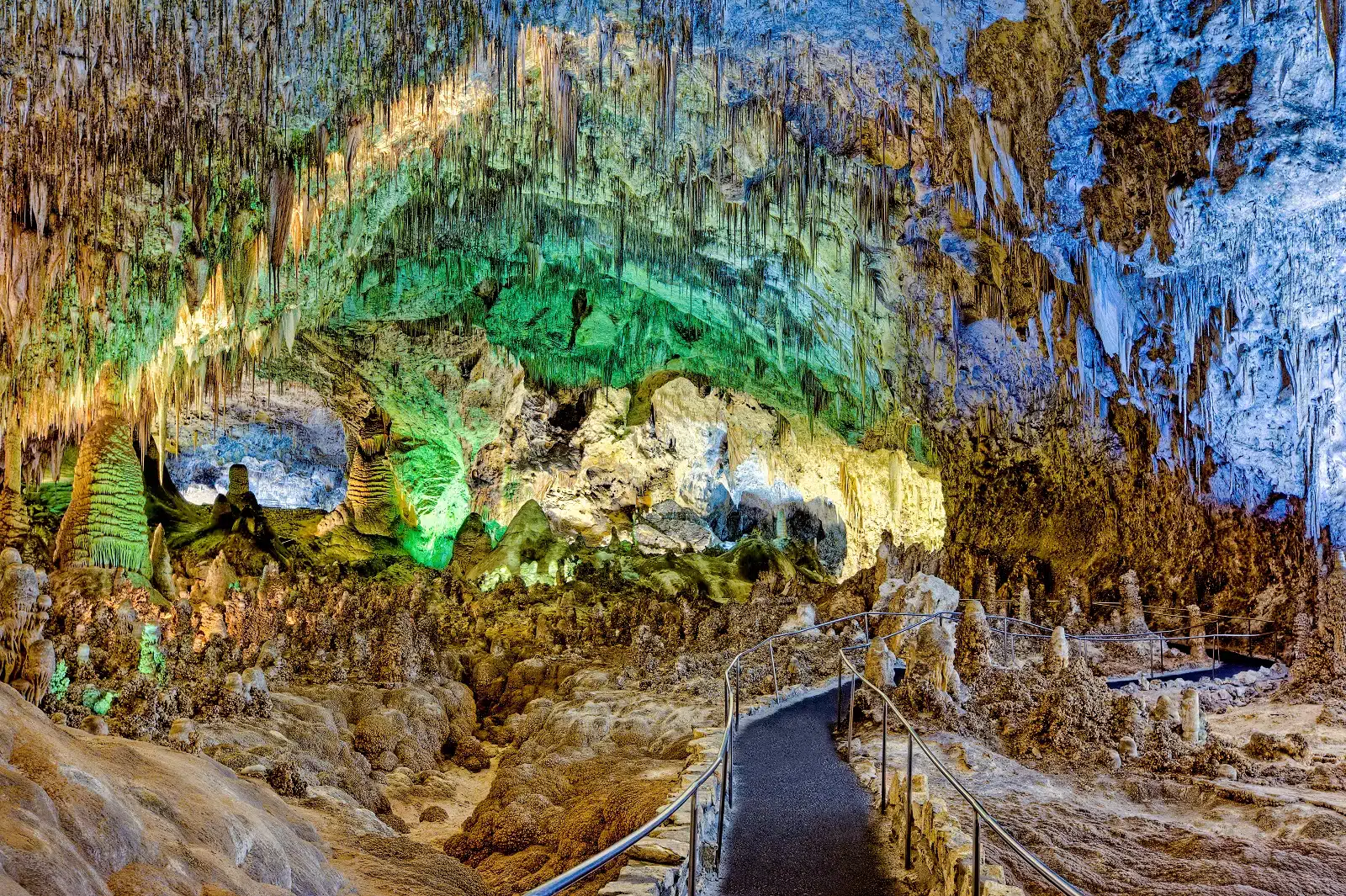
Image Credit: Shutterstock / Doug Meek
Carlsbad Caverns in New Mexico is a UNESCO World Heritage Site and one of the most famous cave systems in the world. The caverns are known for their large underground chamber, the Big Room, one of North America’s largest. The cave system features remarkable formations like stalactites, stalagmites, and helictites, formed over millions of years. Visitors can enter the cave through its natural entrance, a path that descends over 750 feet below the surface. The descent leads to a fascinating underground world, with guided tours offering insights into the cave’s geology, history, and the unique ecosystem that thrives in the dark. The Bat Flight Program, where visitors can watch thousands of bats emerge at dusk, adds to the cave’s allure.
Insider’s Tip
Attend the Bat Flight Program at dusk to see thousands of bats emerge from the cave.
When to Travel
May to October for the full range of tours and the Bat Flight Program.
How to Get There
Fly to El Paso, Texas, and drive to Carlsbad Caverns National Park.
9. Reed Flute Cave, Guilin, China
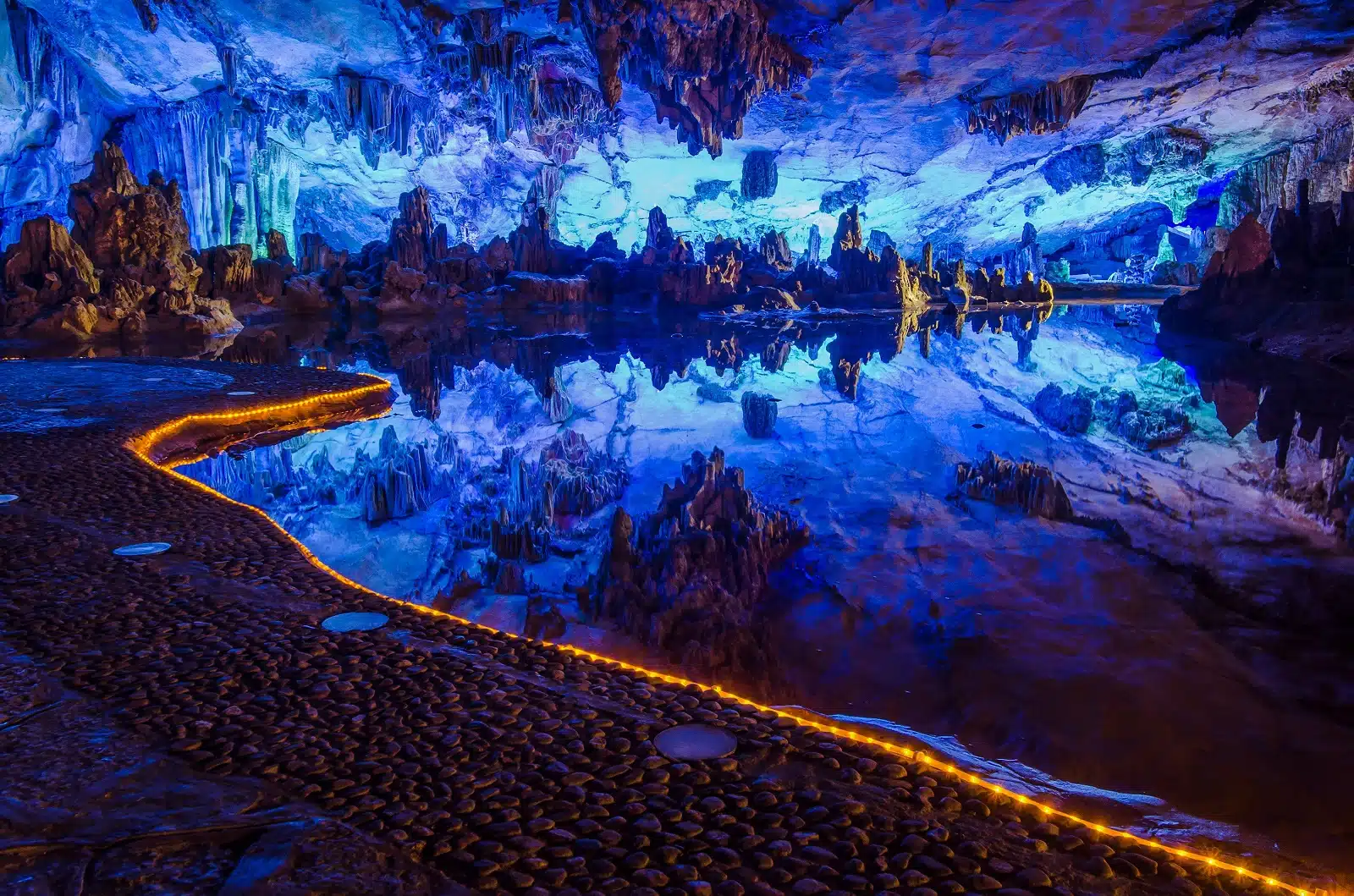
Image Credit: Shutterstock / Dene’ Miles
Reed Flute Cave, located in Guilin, China, is known as “the Palace of Natural Arts” for its stunning array of multicolored stalactites, stalagmites, and rock formations. This 180 million-year-old cave is illuminated by artificial lighting, enhancing its natural beauty and creating a magical atmosphere. The cave’s interior, with its crystal-clear pools and stone pillars, is adorned with more than 70 inscriptions, some dating back to the 8th century. The Reed Flute Cave is a geological wonder and a historical and cultural landmark, offering a glimpse into ancient Chinese traditions and beliefs.
Insider’s Tip
Visit during the off-peak season to avoid crowds and enjoy a more peaceful experience.
When to Travel
April to October for the best weather.
How to Get There
Fly to Guilin and drive to Reed Flute Cave.
10. Marble Caves, Chile
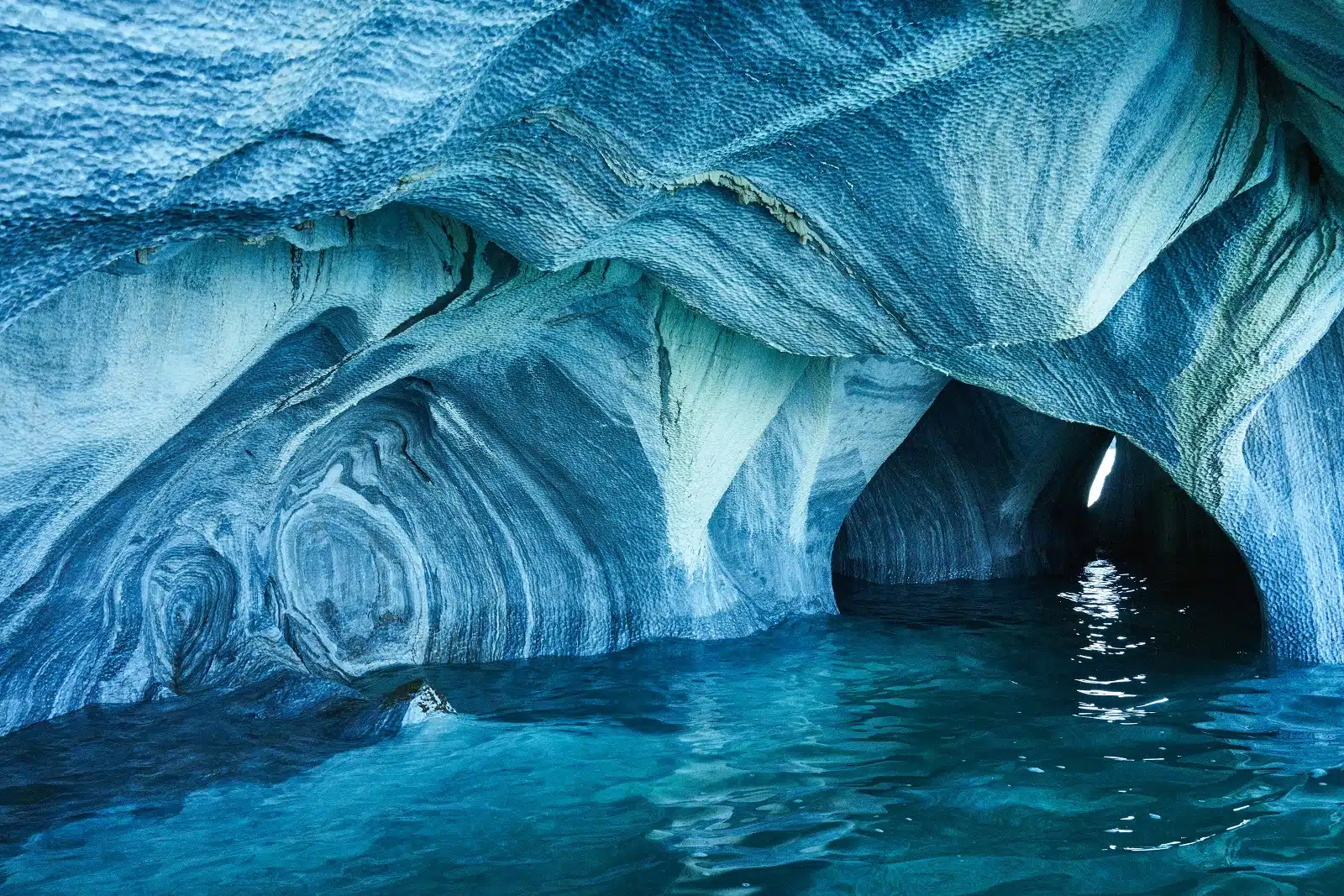
Image Credit: Shutterstock / Nektarstock
The Marble Caves, located on Lake General Carrera in Chile’s Patagonia region, are a breathtaking natural formation. These caves, formed by thousands of years of waves washing against calcium carbonate, are known for their smooth, swirling patterns of blue and white marble. The play of light and reflection on the marble, combined with the lake’s azure waters, creates a mesmerizing effect. Accessible only by boat, the Marble Caves offer a tranquil and unique experience, showcasing the beauty of natural erosion and the pristine environment of Patagonia.
Insider’s Tip
Visit on a calm, sunny day for the best light reflection on the marble.
When to Travel
December to March for the best weather and accessibility.
How to Get There
Fly to Balmaceda, then drive and take a boat to the Marble Caves.
11. Fingal’s Cave, Scotland
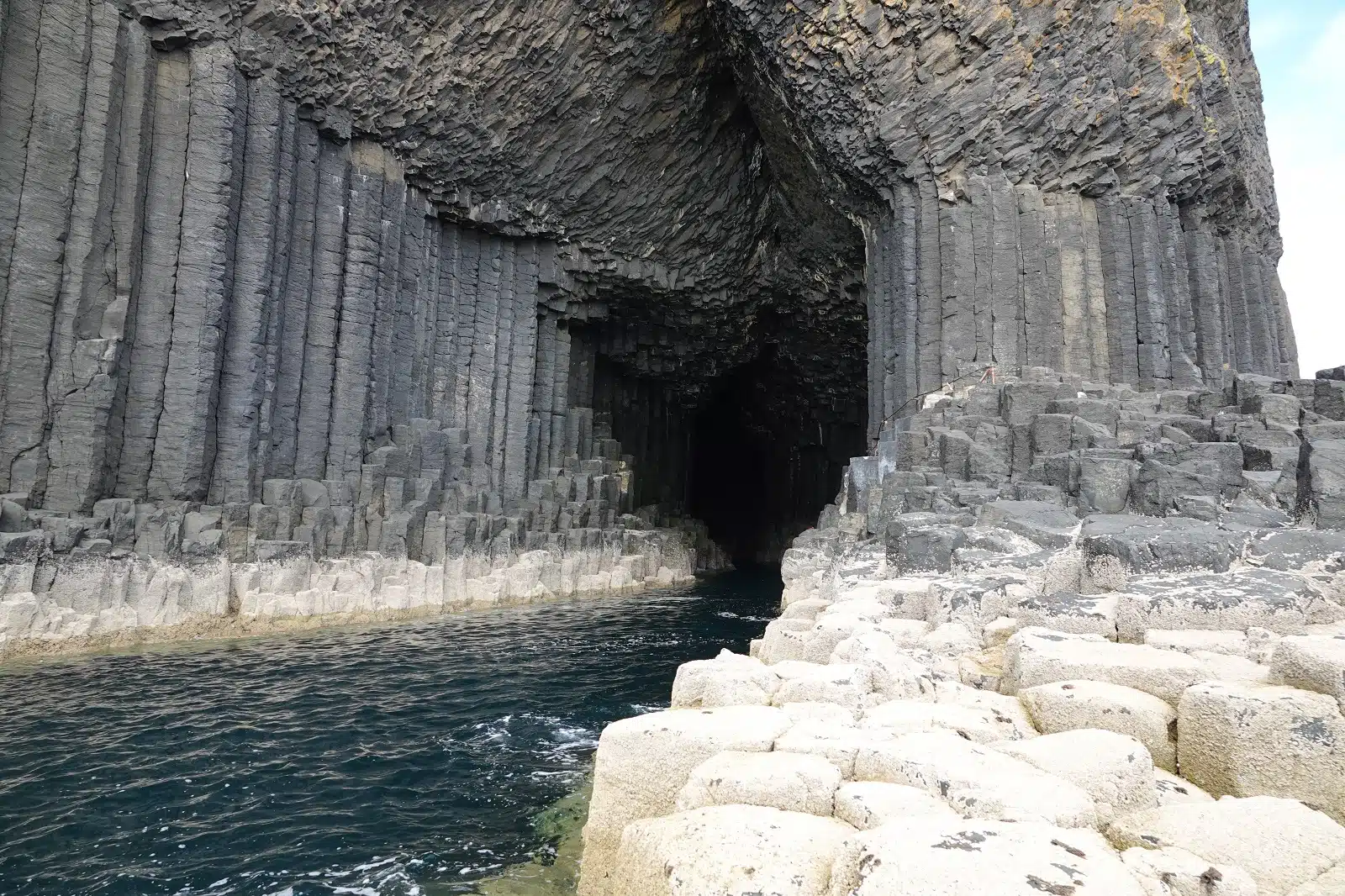
Image Credit: Shutterstock / Andy J Billington
Fingal’s cave, on the uninhabited Isle of Staffa in Scotland, is renowned for its striking basalt column formations and natural acoustics. The cave’s hexagonal columns, formed by the cooling of lava, create a cathedral-like structure that has inspired artists and composers throughout history. The sound of waves echoing against the columns and the dramatic ocean backdrop visit Fingal’s Cave, a sensory and awe-inspiring experience. The cave’s remote location and the rugged beauty of the Isle of Staffa add to its mystique, making it a must-visit for nature and art enthusiasts alike.
Insider’s Tip
Check the weather and sea conditions before planning your visit, as they can affect access.
When to Travel
May to September for the best chance of calm seas.
How to Get There
Fly to Glasgow and take a ferry or boat tour to the Isle of Staffa.
12. Blue Grotto, Capri, Italy
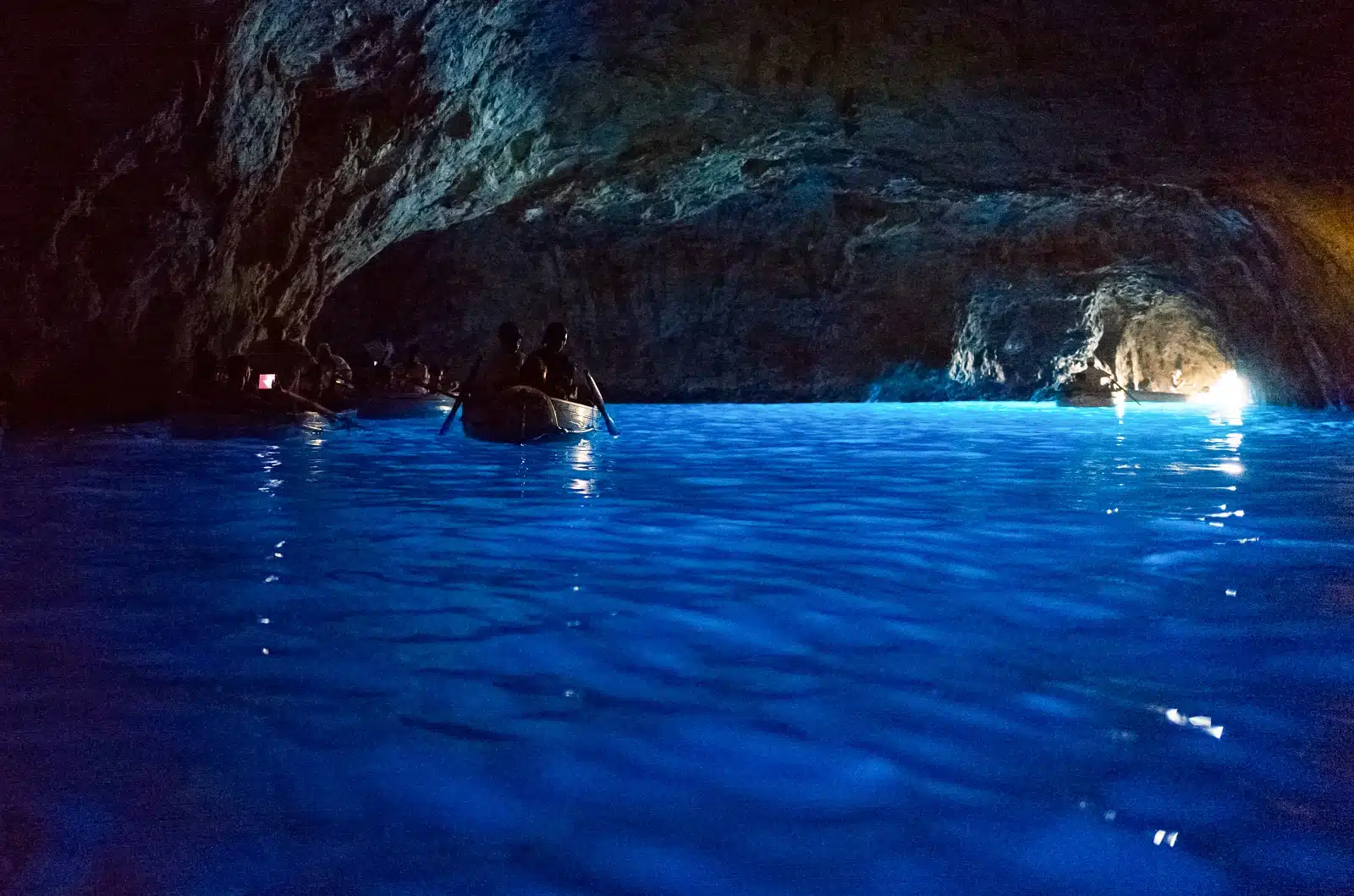
Image Credit: Shutterstock / Gimas
The Blue Grotto on the coast of Capri is a sea cave celebrated for its brilliant blue water, created by sunlight passing through an underwater cavity. This natural phenomenon gives the cave an ethereal glow, creating a surreal and enchanting atmosphere. Accessible only by small rowboats, the experience of entering the Blue Grotto is both thrilling and magical. The cave has been a wonder since Roman times. It continues to captivate visitors with its natural beauty and the play of light on the Mediterranean waters.
Insider’s Tip
Visit early in the morning or late in the afternoon to avoid the tourist rush.
When to Travel
April to October for the best chance of calm seas and good weather.
How to Get There
Fly to Naples, then take a ferry to Capri and a boat to the Blue Grotto.
The Bottom Line
Embarking on a caving adventure takes you into the depths of the earth, where you’ll discover natural wonders, ancient history, and geological marvels. Each cave offers a unique experience, from Waitomo’s bioluminescent glow to Mammoth Cave’s vast chambers. As you explore these subterranean landscapes, you’ll better appreciate the planet’s hidden beauty and the mysteries beneath the surface.
More From The Green Voyage
12 Best Practices for Sustainable Travel in 2024 – How to Travel With Minimal Environmental Impact
Unlocking Hotel Perks – A Traveler’s Guide to Maximizing Hotel Reward Programs for Optimal Benefits
Travel Hacks for Frequent Flyers – 6 Tips and Tricks to Make the Best of Air Travel
The post Adventures in 12 of the World’s Most Fascinating Caves – The Ultimate Guide to Caving 2024 first appeared on The Green Voyage.
Featured Image Credit: Shutterstock / proslgn.
For transparency, this content was partly developed with AI assistance and carefully curated by an experienced editor to be informative and ensure accuracy.
Tips for Trip Success
Book Your Flight
Find an inexpensive flight by using Kayak, a favorite of ours because it regularly returns less expensive flight options from a variety of airlines.
Book Your Hotel or Special Accommodation
We are big fans of Booking.com. We like their review system and photos. If we want to see more reviews and additional booking options, we go to Expedia.
You Need Travel Insurance!
Good travel insurance means having total peace of mind. Travel insurance protects you when your medical insurance often will not and better than what you get from your credit card. It will provide comprehensive coverage should you need medical treatment or return to the United States, compensation for trip interruption, baggage loss, and other situations.Find the Perfect Insurance Plan for Your Trip
